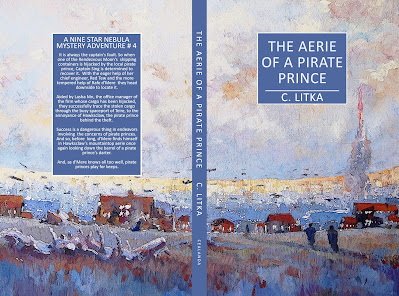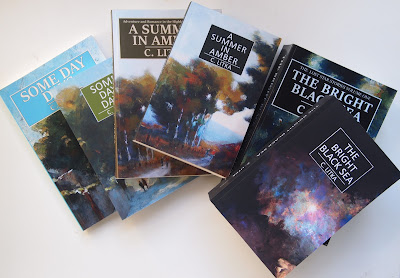Ship of Magic (The Liveship Traders Trilogy Book 1) by Robin Hobb
DNF (44%)
I must confess that
I am no great fan of fantasy, despite the fact that I seem to have
been reviewing a lot of fantasy recently. Blame that on the fact that TOR keeps offering
me free ebooks, many of which are fantasy. In the case of this book,
however, I picked it up from the library because Robin Hobbs is a
very highly regarded writer, and this book in particular, because I like
books about the sea.
Please note that in
general my favorite books are written in first person, character
focused, and are straight ahead narrative adventures. I enjoy clever,
witty, writing that is in itself enjoyable. What I don’t like…
well, I’ll go into that with the Ship of Magic.
Be careful what you
wish for, since wishes sometimes come true. As I said above, I like
character focused stories. Ship of Magic is a very, very
character focused story.
So much so that it
seemed more like a character
study, a tableau
rather than a story.
I am certain that there’s
a story somewhere in the deep weeds of the
world building much
of which is accomplished by the
international dialog of
her cast of characters.
However, I
lost patience trying to find anything
more than a slight, slow
wisp of it as it
crept along. The fact that
I stuck with this story for 44% of it – and it’s a big book –
is a testament to my
hope of eventually finding the
story. However,
when I realized how much I
was skim-reading this book,
I gave up. If I ever find
that I care enough, I’ll
look it up on its Wikipedia entry. I haven’t so far.
Remember
what I said about liking first person narratives – well this an
omnipresent third person narrative. I generally don’t mind close
third person narratives, but most omnipresent ones turn me off.
In this story we
weren’t god-like beings following the movement of characters like
chess pieces from a
remote height, instead we are treated to the internal thoughts of at least six characters.
There are the sea serpents – for some reason. And then there’s
Captain Hook ,and his pirate in the story. Well, his name isn’t Hook and he’s
sans-hook, but having said that, he’s
Captain Hook in every other respect, and the best character of the
lot, despite being despicable. We
are also treated
to the internal soliloquies, endless family worries, and arguments of the shipowner/trader family who are the
central characters of the story. As well those of some magical
ships.
Perhaps, if you have read other books in
Hobb’s
fantasy world, all the world-building going on in the minds and
memories might mean a trip down memory lane
for you, but for me, this being the first Hobb book, I found it
tedious. In short, if
you find family arguments fascinating, then this book is for you. If
you like mean people, you’ll like this book as
well.
My
other great complaint is that I hate when authors slice and dice
their stories, and /or jump from one story to another within the book.
Here we have a sea-serpent story – I
paid no attention to it.
We have Captain Hook’s’ story. We have the shipowner family's various stories,
with at least five members having their own story
arcs as well, all of which
are sliced, diced, and intertwined,
sometimes within chapters. And more story threads seemed in the offing when I called it a day. Too many "main" characters to follow made it impossible for me to latch on to anyone of them, or to care
about any of them. I realize that I’m in the minority here, for
this is the current
fashion of storytelling, so you, dear reader, might find this a plus.
As
for the writing itself, well, she is rightly considered a master. She
is a very easy and colorful read. However,
early on I found that her use of similes and/or metaphor had me rolling my
eyes and knocking me out of the story. For example; “Her
breasts surged against her dress like seas threatening to swamp the
gunwales of a boat.”
Or take; “...the
Divvytown lagoon harbor had all the beckoning charm of an unemptied
chamber pot.” Or try this one on for size: “Coming
to Divvytown was, he reflected, rather like being towed to dock in
the musk and stench of a slave’s armpit.” They
struck
me as
straight out of a
creative
writing 101
course
assignment. I noticed fewer of them as I went along – but then I
was skim-reading more
and
more as I went along so I may have missed them. Another
reviewer said of another of her books
that
he while
enjoyed
reading the first half of the book, he
realized that nothing much had happened. I think that sums it up. If
you like her writing – and except for those similes or metaphors
noted above, I have no complaints what so ever, and if you like being
someone’s mind as they
turn problems
and worries over
and over in their thoughts – which I don’t – you’ll probably
love this book. I wish I could. But no. And if I didn’t know it
before, fantasy isn’t for me.












